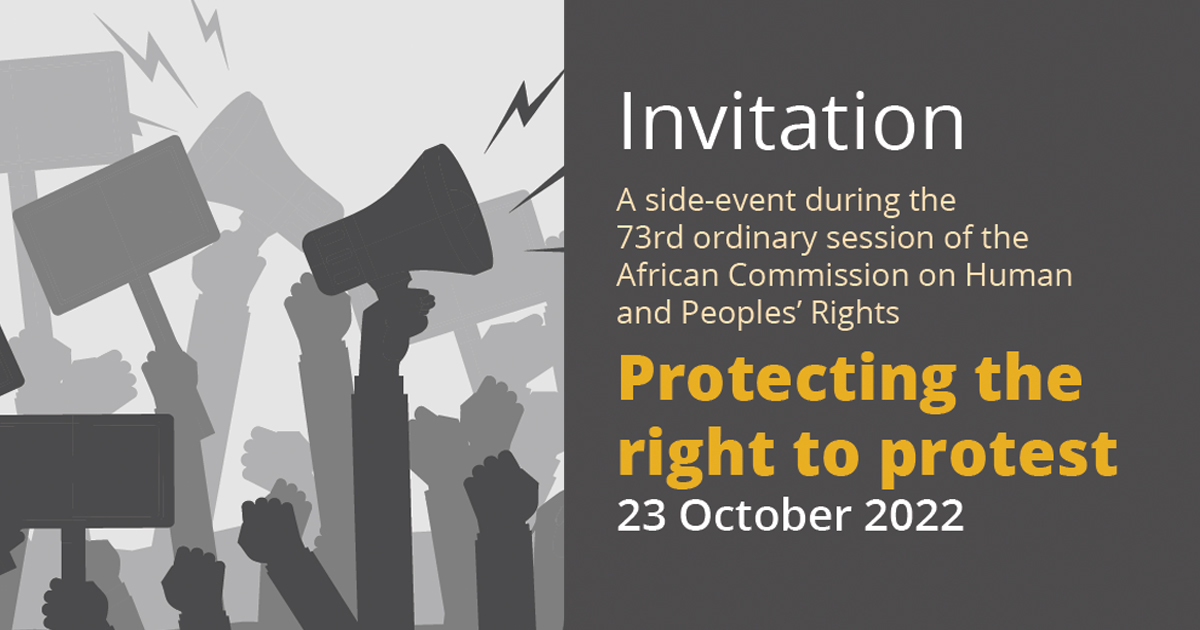Amnesty International, the Centre for Human Rights, University of Pretoria and UN Special Rapporteur on Freedom of Assembly are hosting an event on Protecting The Right To Protest in Africa on the Side-lines of the ACHPR 73rd Ordinary Session.
Date: 23 October 2022
Time: 11:30 - 14:00 GMT
Venue: International Conference Centre, Kerr Serign, The Gambia
Protests are a means to express dissent, opinions, and ideas, expose injustice and abuse, and demand accountability from those in power. Protests can be spontaneous or organized, individual or collective. Historically, protests have been an important vehicle for advancing human rights. The right to protest is therefore one of the most necessary rights in a democracy as it is a tool for fostering the rule of law and good governance principles. The right to protest is protected by various international and regional human rights treaties.
This right is not a separately given right, but one which is found in the exercise of a variety of rights, particularly the right to peaceful assembly and right to freedom of expression. The African Charter on Human and Peoples Rights preserves the right to protest by guaranteeing the right to free expression (Art. 9) freedom of association (Art. 10), and freedom of assembly (Art. 11). These rights are similarly protected by the International Covenant on Civil and Political Rights.
Objectives of the side-event
- To facilitate a discussion among relevant stakeholder on the ways to protect the right to protest, in all contexts including during elections and in times of crises.
- To highlight recent trends and tactics deployed by States to restrict the right to protest and develop an effective response.
- To engage relevant stakeholders on ways to sustainably address the recurring challenges on the violation of this right.
- To engage the regional bodies to encourage states to comply with the principles of precaution, proportionality and necessity in the use of force avoiding at all times the use of lethal force to protesters except as a last resort measure for preventing serious harm.
- To engage the regional bodies to ensure states adopt prompt, transparent, effective, independent and impartial investigations into all allegations of human rights violations, particularly the use of excessive force by security forces during protests.
Panelists
- Clement Voule, UN Special Rapporteur on the rights to freedom of peaceful assembly and of association
- Prof Remy Ngoy Lumbu, Special Rapporteur on the rights of human rights defenders and focal point for reprisals in Africa and chairperson, African Commission on Human and Peoples’ Rights
- Bonolo Makgale, Programme Manager, Democracy and Civic Engagement Unit, Centre for Human Rights, University of Pretoria
- Japheth Biegon, Africa Regional Advocacy Coordinator, Amnesty International
Moderator:
- Ms. Sarah Wesonga
Programme Officer-Transparency and Access to Information
Article 19
NB: PLEASE NOTE THAT LUNCH WILL BE SERVED BEFORE THE ACHPR 73rd ORDINARY SESSION
For more information please contact:
Ms. Bonolo Makgale
Programme Manager: Democracy and Civic Engagement Unit
Tel: +27 (0) 12 420 4199
Fax: +27 (0) 86 580 5743
bonolo.makgale@up.ac.za
Dr. Japhet Biegon
Africa Regional Advocacy Coordinator, Amnesty International
japhet.biegon@amnesty.org


